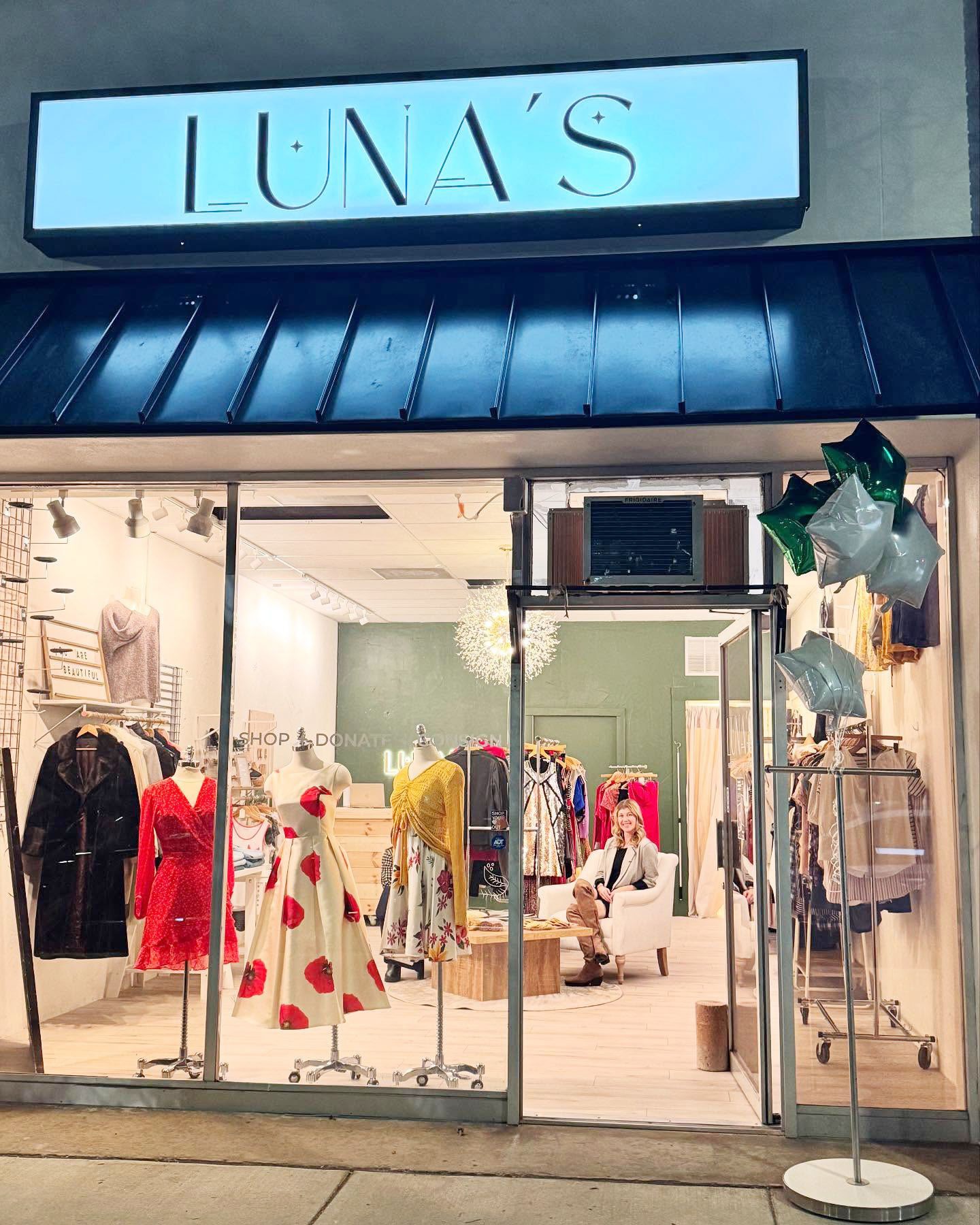In early February, a new consignment shop opened along North Nevada Avenue in Downtown Colorado Springs. Luna’s Sustainable Fashion Boutique was inspired by a quirky habit of the owner’s cat, Luna. According to Tiffany Wismer, the shop’s owner, the idea for the store began with Luna’s amusing behavior.
“It’s actually kind of funny how it started. My cat Luna had this odd habit – she would go out into the neighborhood, come back with socks, hats, and other clothing items in her mouth, then leave them at my door like little offerings. My friends and I used to joke that she was ‘thrifting,'” Wismer explained. “When I decided to open the shop, it felt like the perfect thing to name it after her.”
The shop’s storefront is simple and inviting. Walking through the front doors feels like receiving a hug from the sunshine itself, with natural light flooding the space. Racks of clothing line the walls, tempting visitors to sift through them. In the back left corner, Wismer is often found behind the register, lit from behind by a glowing sign for the shop.
Inspired by the simplicity of French fashion, Wismer curates a selection of closet staples. Shoppers can find solid basics, elegant floral patterns, sturdy denim, chunky sunglasses and jewelry that effortlessly shines.
A Colorado Springs resident for 30 years, Wismer told the Bulletin that her decision to open Luna’s was driven by a desire for a more fulfilling life – one that moved away from a desk job.
“I’ve always been interested in fashion and sustainability. I never really thought about opening a store until last year when I started thinking about where my interests intersect,” Wismer said.
She added that opening Luna’s would not have been possible without the support of her local community.
“I’ve lived here for 30 years, and this is my community. I could never have done this without the support of so many people – friends and other business owners – who offered their time and expertise as I started this venture. I’ve never owned a business before, so that help has been invaluable,” Wismer said. “It’s fitting, because this business truly depends on the community to survive and thrive. My inventory – every beautiful item in here – comes from the closets of Colorado Springs women.”
You don’t have to break the bank to buy nice clothes. – Tiffany Wismer, owner of Luna’s Sustainable Fashion Boutique
Wismer explained that she sources her clothing through consignors and donations. Consignors can schedule appointments to bring in their items, and if she believes they fit the store’s style, she will accept them. Consignors receive 40% of the sale price, or can choose to have the item returned or donated if it doesn’t sell.
“I try to take everything I can. If it fits with the vibe of the store-basics, work clothing, versatile pieces that most women could incorporate into their wardrobes-I’ll take it,” she said.
Through this business model, Wismer hopes to keep quality clothing in circulation at affordable prices, rather than letting it end up in a landfill.
“You don’t have to break the bank to buy nice clothes. Those nice clothes are already out there-in someone else’s closet. I hear it all the time from my consignors: ‘I love this dress or shirt, but it doesn’t fit me anymore,’ or ‘I just don’t wear it anymore, but it’s so pretty.’ If I can get those items in here and resell them at an affordable price to women who will appreciate them, everyone wins,” Wismer explained.
According to the Center for Biological Diversity, the number of garments produced annually worldwide has doubled over the past two decades, and global fashion consumption has increased by over 400%. Additionally, the fast fashion industry is responsible for as much as 10% of global carbon dioxide emissions.
Wismer’s commitment to quality clothing is evident in the pieces she carefully selects to carry. Holding up a navy blue sweater from the back of her chair, she explained why this garment, purchased from her own store, has become a wardrobe staple.
“Emily Ross from Yobel Market brought in some beautiful sweaters, and one day, when it got chilly in the shop, I put on this cardigan – this one I’m wearing right now. It’s 80% organic cotton, 20% wool. It’s hand-made and I can’t take it off. You can really feel the difference in quality. Not everything in the store is this high-quality yet, but that’s the goal,” Wismer said.
Shopping second-hand is not only more affordable, but also better for the environment.
“What we wear is universal. Clothing is one of the oldest industries in the world, second only to food. The goal is to first keep well-made items in circulation and out of landfills, and second, to return to textiles as agriculture and move away from fast fashion. Those fast fashion items you buy from places like Temu just don’t feel as good as this sweater. I know they’re cheap, and that’s why we buy them. But in the long run, it’s actually less expensive to buy something like this second-hand because it will last forever, while those cheap items will end up in the trash after a few washes. We’re all guilty of it, but I think that can change – with more information and more conversation,” Wismer said.


